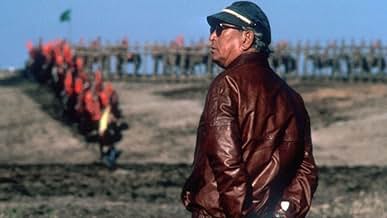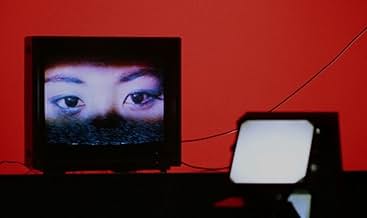A.K.
- 1985
- 1h 15min
VALUTAZIONE IMDb
7,0/10
1288
LA TUA VALUTAZIONE
Aggiungi una trama nella tua linguaA documentary that shows the production of Ran and discusses the film techniques of Kurosawa himself.A documentary that shows the production of Ran and discusses the film techniques of Kurosawa himself.A documentary that shows the production of Ran and discusses the film techniques of Kurosawa himself.
- Regia
- Sceneggiatura
- Star
Takeji Sano
- Self
- (as Takeharu Sano)
Fumisuke Okada
- Self
- (as Fumisake Okada)
Vittorio Dalle Ore
- Self
- (as Vittorio)
Recensioni in evidenza
I got the Ran DVD and this was packaged with it. i thought it would be great because this is from Chris Marker director of La Jetee. how wrong i was this is boring pretentious filmaking at its best. if you like long takes of a tape recorder and an old man walking round who we are told on numerous occasions that he has impeccable manners then this is right up your ally. Avoid this you could probably learn more about the making of the film from watching it. this provided no insight in the world of Kurosawa all i know about him is he has impeccable manners or have i mentioned that already... But anyway just because you are a competent filmmaker doesn't mean your a competent filmmaker about filmaking. Oh and PS Akira Kurosawa has impeccable manners!
Akira Kurosawa's RAN is generally regarded as one of his very best films. It is clear by the amount of critical praise it received (not to mention it's IMDb top 250 status) that it is regarded by many as one of the director's most challenging, audacious pieces of work. It's King Lear filtered through the simplest, most daring Akira Kurosawa one could figure, with compositions that stay with the open viewer long after the film ends. It is with this in mind that Chris Marker- avant garde director of films like La Jetee- takes on Kurosawa's film for his own documentary project. Like Kurosawa's film, there are some deliberate shots as well, plus narration that sometimes tries for the poetic and sometimes misses.
But its own straightforward, unique qualities parallel those of the film in the film. One example of its difference to a film like Lost in La Mancha is that here the audience has more hindsight as to the actual course of the film (completed) and that it leaves room for any kind of interpretation in presentation. Take when Marker focuses squarely on the images of make-up, the heavy metal costumes for the extras, and the everyday dialog that goes on with people that are taken for granted occasionally amid the filmmaker's own vision of a scene. They're shown in very matter-of-fact ways, as to not obtrude too much into Kurosawa. There are some curious, odd cut-backs to a room with a TV, recorder, and other things that Marker uses to cut away to from the location shooting, which can be hit or miss.
It's seeing the Japanese master himself making this film, and what goes into it, that keeps in fascinating throughout. It's one of the more awe-inspiring films about real modern film-making around.
But its own straightforward, unique qualities parallel those of the film in the film. One example of its difference to a film like Lost in La Mancha is that here the audience has more hindsight as to the actual course of the film (completed) and that it leaves room for any kind of interpretation in presentation. Take when Marker focuses squarely on the images of make-up, the heavy metal costumes for the extras, and the everyday dialog that goes on with people that are taken for granted occasionally amid the filmmaker's own vision of a scene. They're shown in very matter-of-fact ways, as to not obtrude too much into Kurosawa. There are some curious, odd cut-backs to a room with a TV, recorder, and other things that Marker uses to cut away to from the location shooting, which can be hit or miss.
It's seeing the Japanese master himself making this film, and what goes into it, that keeps in fascinating throughout. It's one of the more awe-inspiring films about real modern film-making around.
A documentary that shows the production of "Ran" and discusses the film techniques of Akira Kurosawa himself.
This documentary is not necessarily great in itself, as it may mean very little to those not otherwise familiar with its subject, but serves as a wonderful supplement for the movie "Ran". Anyone who loves "Ran" or Kurosawa's work will certainly get something more out of seeing the actors and director at work when the cameras are not rolling. Well, the cameras are still rolling... but different cameras.
Coming from Chris Marker, it is no surprise that even a simple making-of documentary would have some artistic license. He shows some footage via a television set, and some audio via a tape recorder, rather than incorporated into the documentary itself. Clever or pretentious? Who knows?
This documentary is not necessarily great in itself, as it may mean very little to those not otherwise familiar with its subject, but serves as a wonderful supplement for the movie "Ran". Anyone who loves "Ran" or Kurosawa's work will certainly get something more out of seeing the actors and director at work when the cameras are not rolling. Well, the cameras are still rolling... but different cameras.
Coming from Chris Marker, it is no surprise that even a simple making-of documentary would have some artistic license. He shows some footage via a television set, and some audio via a tape recorder, rather than incorporated into the documentary itself. Clever or pretentious? Who knows?
Chris Marker's elliptical, oblique documentary on the making of Akira Kurosawa's "Ran" is an uneasy blend of hagiography (usual Cahiers du Cinema stuff) and Marker's trademark meditations on the mediating role of technology in memory and the human experience, plus probably aging, and etc., etc., etc. These Gallicisms seem out-of-place; but the philosophies are easily discarded. What makes the film a pleasure are the glimpses we see of Kurosawa's work processes, in addition to all the detail and work that goes into the making of a true epic.
It's more artsy and potentially interesting than the average making-of documentary- to the point where it's hard to call it a making-of documentary- but it is a little dull at times, even with the short length.
Still, not bad- just wish Werner Herzog had directed it, as I feel he's better at these sorts of quirky, fly on the wall, occasionally weird, sort of artsy and psychological documentaries/ character studies.
Does tell me I need to watch Ran again though- it's been about eight years. And while 17-year-old me appreciated it, 25-year-old me would probably be able to watch it without feeling bored.
Still, not bad- just wish Werner Herzog had directed it, as I feel he's better at these sorts of quirky, fly on the wall, occasionally weird, sort of artsy and psychological documentaries/ character studies.
Does tell me I need to watch Ran again though- it's been about eight years. And while 17-year-old me appreciated it, 25-year-old me would probably be able to watch it without feeling bored.
Lo sapevi?
- QuizThis documentary will be included as part of the Criterion Collection DVD edition of Ran (1985).
- Citazioni
Chris Marker: [narrating] In this kind of shooting, the first pitfall to avoid is appropriating a beauty that does not belong to us - to play up the lovely, backlit shot. Of course, some of that borrowed beauty will come through anyway, but we shall try to show what we see the way we see it, from *our* eye-level.
- ConnessioniFeatured in Music for the Movies: Tôru Takemitsu (1994)
- Colonne sonoreString quartet, A Way Alone, mov.1
Composed by Tôru Takemitsu
I più visti
Accedi per valutare e creare un elenco di titoli salvati per ottenere consigli personalizzati
Dettagli
Contribuisci a questa pagina
Suggerisci una modifica o aggiungi i contenuti mancanti




















